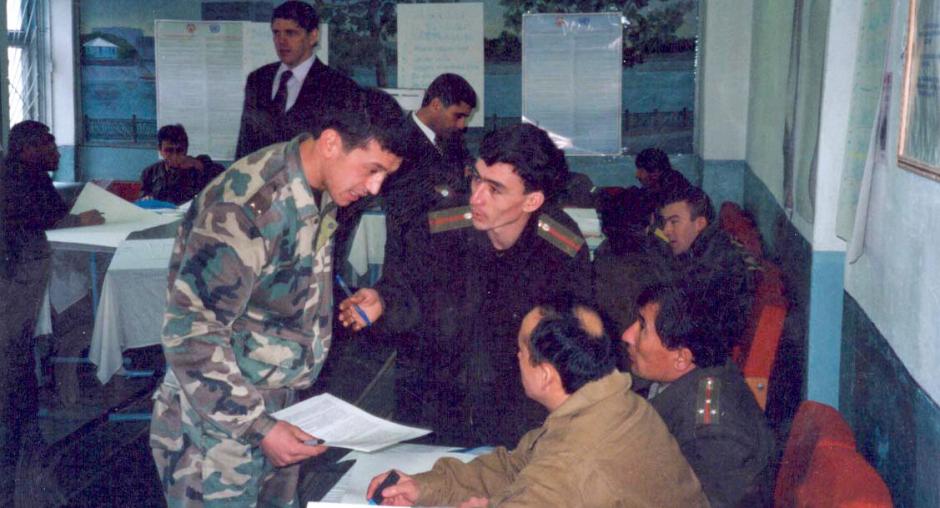Newsroom
Tajik law enforcement bodies call for improvement of the criminal procedural code
KHUJAND 12 March 2002

(OSCE)Prison personnel participating in a human rights training course
held by the OSCE Office for Democratic Institutions and Human
Rights (ODIHR), Sughd, northern Tajikistan, January/February
2002. (OSCE) Photo details
KHUJAND, 12 March 2002 - A series of OSCE training seminars for law enforcement personnel on human and civil rights during arrest, detention and pre-trial investigation has concluded in the Sughd province, Tajikistan.
Since November 2001, the OSCE Mission to Tajikistan has conducted altogether 10 such seminars for more than 300 people representing the office of the Prosecutor General, departments of the interior, independent lawyers, and employees of local governments. Representatives of local NGOs and media also took part.
During the seminars participants agreed on the need to modernize the current Criminal Procedure Code, which was adopted in 1961, in order to bring it into compliance with international commitments undertaken by Tajikistan. A list of recommendations were made and forwarded to the working group revising that code and to other relevant authorities.
The forum recommended improving the provisions governing the protection of detainees' rights and pointed to the need for legal education of the population in order to ensure effective public control over law enforcement bodies. The participants also suggested there was a need to improve the proficiency rating of law enforcement personnel and to review the existing evaluation system for the work of law enforcement bodies.
The seminars were organized by the OSCE Mission to Tajikistan and the Mission's Khujand Field Office, the OSCE Office for Democratic Institutions and Human Rights (ODIHR) and the office of the Prosecutor General of the Sughd Province.
Since November 2001, the OSCE Mission to Tajikistan has conducted altogether 10 such seminars for more than 300 people representing the office of the Prosecutor General, departments of the interior, independent lawyers, and employees of local governments. Representatives of local NGOs and media also took part.
During the seminars participants agreed on the need to modernize the current Criminal Procedure Code, which was adopted in 1961, in order to bring it into compliance with international commitments undertaken by Tajikistan. A list of recommendations were made and forwarded to the working group revising that code and to other relevant authorities.
The forum recommended improving the provisions governing the protection of detainees' rights and pointed to the need for legal education of the population in order to ensure effective public control over law enforcement bodies. The participants also suggested there was a need to improve the proficiency rating of law enforcement personnel and to review the existing evaluation system for the work of law enforcement bodies.
The seminars were organized by the OSCE Mission to Tajikistan and the Mission's Khujand Field Office, the OSCE Office for Democratic Institutions and Human Rights (ODIHR) and the office of the Prosecutor General of the Sughd Province.
